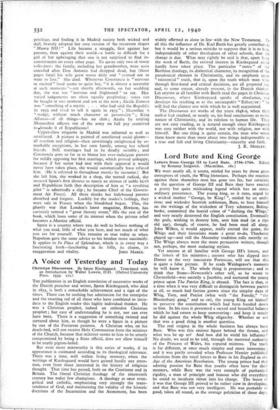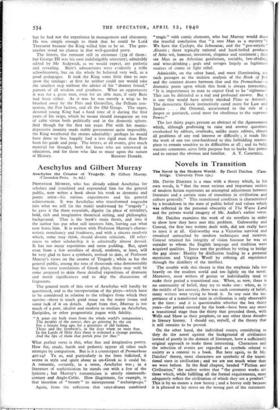Lord Bute and King George
Letters from George HI to Lord Bute. 1756-1766. Edited by Romney Sedgwick. (Macmillan. as.) WE were nearly all, it seems, misled for years by those great corruptors of youth, the Whig historians. Perhaps the reaction against these shameless men has gone too far, but certainly on the question of George III and Bute they have erected a pretty but quite misleading legend which has an extra- ordinary persistence. The young king, so it runs, urged by a wicked mother "George, be King ! ", misled by an ambi- tious and wickeder. Scottish nobleman, Bute, to base himself on the writings of the wickedest of Tory schemers, Boling- broke, committed the horrid crime of "dashing the Whigs," and very nearly destroyed the English constitution. Eventually the gods, wishing to destroy him, sent him mad (at a ripe old age), though, of course, he had been mad all along. John Wilkes, it would appear, really started the game, the Whigs and their historians made a great to-do, Thackeray played up—and still the Macaulay tradition rolls merrily on. The Whigs always were the more persuasive writers, though not, perhaps, the most enduring stylists.
Yet anyone at all familiar with George III's letters, and the letters of his ministers ; anyone who has dipped into Donne or the very inaccurate Fortescue, will see that this is quite a false picture. If he reads Waldegrave's memoirs he will know it. The whole thing is preposterous ; and to think that Stone—Newcastle's -other self, as he wrote to Chesterfield—was secretly a Jacobite, and nurtured the young prince upon The Patriot King, is absurd. The fact is that, at a time when it was very difficult to distinguish between parties at all, so much had faction grown since the simpler days of Whig, Tory, and Patriot (what with "the Family," " the Bloomsbury gang," and so on), the young King set himself to preserve the constitution which had been handed down to him. In his eyes it presented a sacred and beautiful balance which he had sworn to keep unwavering : and keep it steady he did against the whole Whig oligarchy. Whether or not that was a good thing is another question.
The real enigma in the whole business has always been Bute. Who was this sinister figure behind the throne, and what was he up to? And how did he wield his influence? No doubt, we used to be told, through the maternal authority of the Princess of Wales, his reputed mistress. The truth is far different, at once much simpler and more interesting ; and it was partly revealed when Professor Namier published selections from the royal letters to Bute in his England in the Age of the American-Revolution. The young prince had that adoring passion for Bute that youths often have for their mentors, while Bute was the very example of puritanical rigidity, a man of principle and honour who did everything he could to inculcate virtue into his charge. The ivorst of it was that George III proved to be rather slow in developing, and that Bute was not very intelligent. He was probably as good, taken all round, as the average politician of those days,
but he had not the experience in management and chicanery. He was simple enough to think that he could be Lord Treasurer because the King willed him to be so. The gate- crasher stood no chance in that well-guarded party.
The letters, the remnant still in existence (339 of them : but George III was his own indefatigable secretary), admirably edited by Mr. Sedgwick, as we would expect, are pathetic and revealing. Bute's admonitions were evidently a trifle schoolmastery, but on the whole he behaved very well, as a good pedagogue. It took the King some little time to out- grow the tutelage : at first he neither could nor would take the smallest step without the advice of his "dearest friend," pattern of all wisdom and goodness. What an opportunity it was for a great man, even for an able man, if only Bute had been either. As it was he was merely a wisp to be brushed away by the Pitts and Grenvilles, the Pelham con- nexion, the Fox faction, and all the Old Gangs. The eager, devoted young King had a hard time of it during the first years of his reign, which he meant should inaugurate an era of calm virtue both politically and in the domestic sphere. And though for the first ten years Pitt with his manic- depressive insanity made stable government quite impossible, the King weathered the storms admirably : perhaps he would have done so less happily had a less rigid man than Bute been his guide and prop. The letters, at all events, give much material for thought, both for those who are interested in education, and for those who like to muse upon the nature



































 Previous page
Previous page